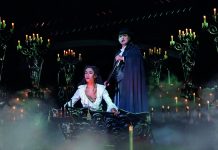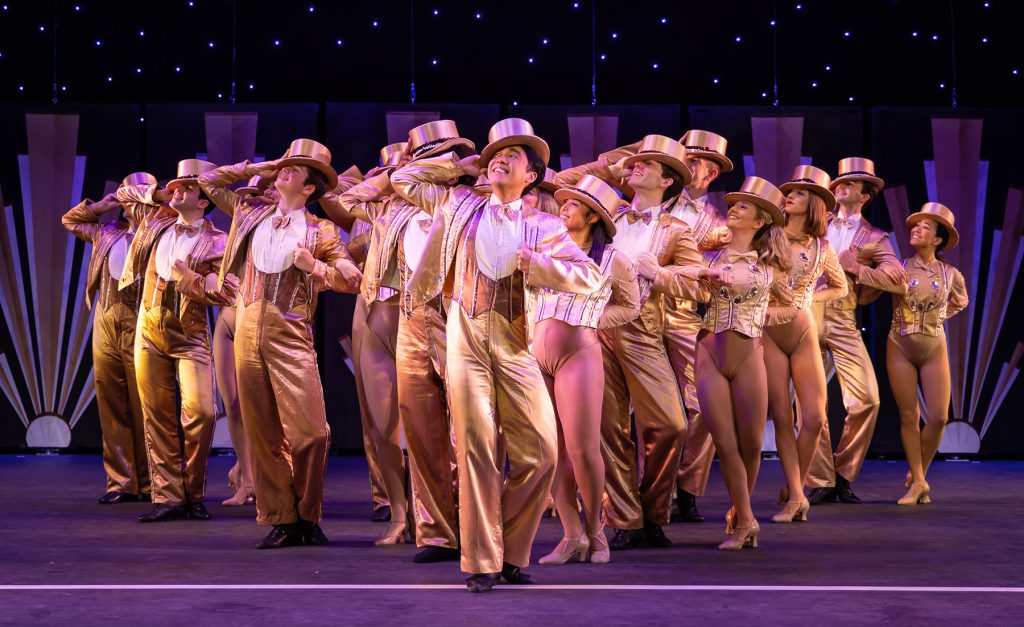
By Eric Marchese | Special to the NB Indy
No question innovation was in the DNA of “A Chorus Line.”
Director-choreographer Michael Bennett conceived of the 1975 show as essentially having no plotline – more or less a series of monologues connected with songs and, of course, loads of dancing.
To boot, the show – book by James Kirkwood and Nicholas Dante and its songs by Marvin Hamlisch (music) and Edward Kleban (lyrics) – unfolds on a bare stage and is performed without intermission. Not your typical Broadway musical.
Laguna Playhouse’s new production shows how Bennett’s concept spun gold from supposed liabilities.
Director and choreographer Luis Villabon serves up a kinetic, eye-catching staging; the book’s layered monologues give Villabon’s well-chosen cast plenty to work with; and Hamlisch’s memorable score elevates Kleban’s equally pungent lyrics.
Whereas Bennett tapped Bob Avian to co-choreograph the original, Villabon handles it all in Laguna, making the task look easy, with music direction by Ricky Pope, and Chris Strangfeld (scenic), Clifford Spulock (lighting) and Ian Scot (sound) as the design team.
The Playhouse’s staging brims with vibrant, joyous, electric energy – and that gives the more starkly realistic moments all the more impact.
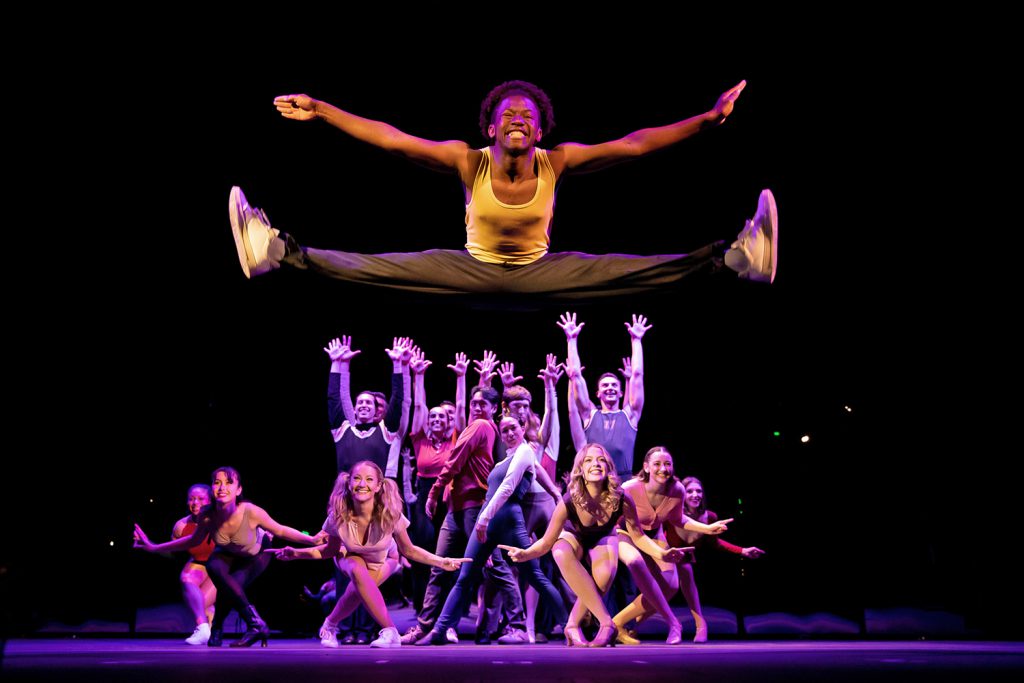
The bare-bones storyline: Hard-driving director Zach (Jonathan Van Dyke) is casting a new Broadway musical. With the help of his assistant choreographer, Larry (James Vinson), he’s auditioning singer-dancers for the show’s chorus.
Zach tells those who have turned out he needs a superlative small chorus of four women and four men, but he’s bored with the same-old same-old of looking at head shots, hearing each dancer recite a brief bio and seeing them execute a few dance steps.
An impatient Zach begins pressing each of the 22 vying for roles in the chorus to explain what it is, exactly, that has brought them there. And he demands increasingly personal details about themselves, their lives, and what made them choose to become professional dancers.
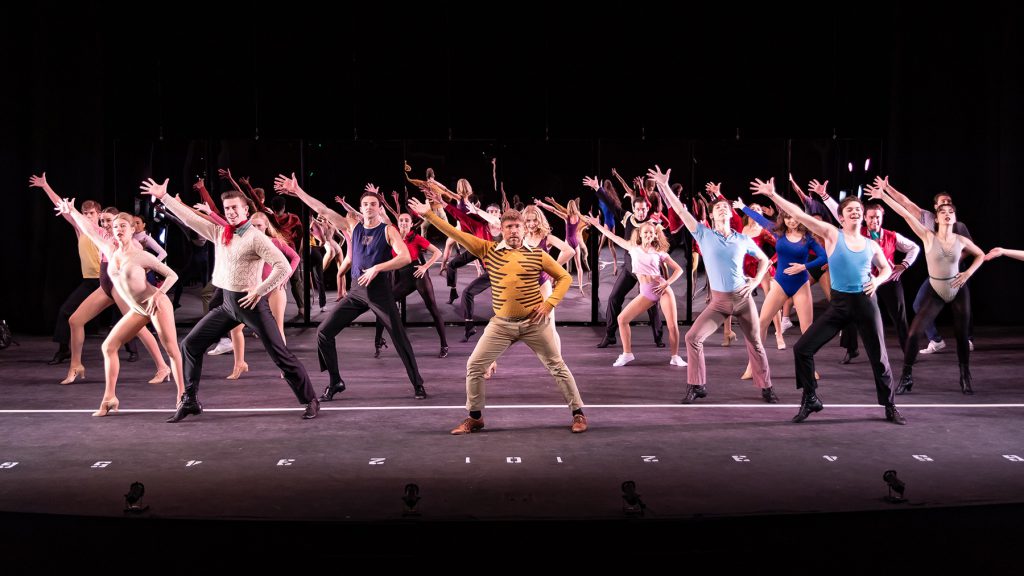
Zach and Larry have soon narrowed the field to 17 potential candidates – more than half of whom will be put through a rigorous afternoon but will ultimately be sent home. To his surprise, one of the dancers is Cassie (Katie Van Horn). Years ago the two were a couple; Zach plucked her from the chorus – and once stardom beckoned, Cassie left him.
Her career has failed to soar, and now she’s back in New York, desperate for a place on “the line” – but Zach deems her overqualified for what amounts to an entry-level spot.
While most of the other applicants are younger than Cassie, some have almost as much experience, while others are startlingly fresh-faced.
That’s what makes “A Chorus Line” such a compelling piece of theater. Writers Kirkwood and Dante combed through interviews with real-life Broadway musical chorus line dancers before distilling them into individual stories.
Those are the stories we hear during the play, and are they ever fascinating. They’re also intensely personal, thanks to Zach’s penchant for posing penetrating questions. As he sees it, he’s got God-like power over this bunch, and he won’t be satisfied until he has bored into their very souls.
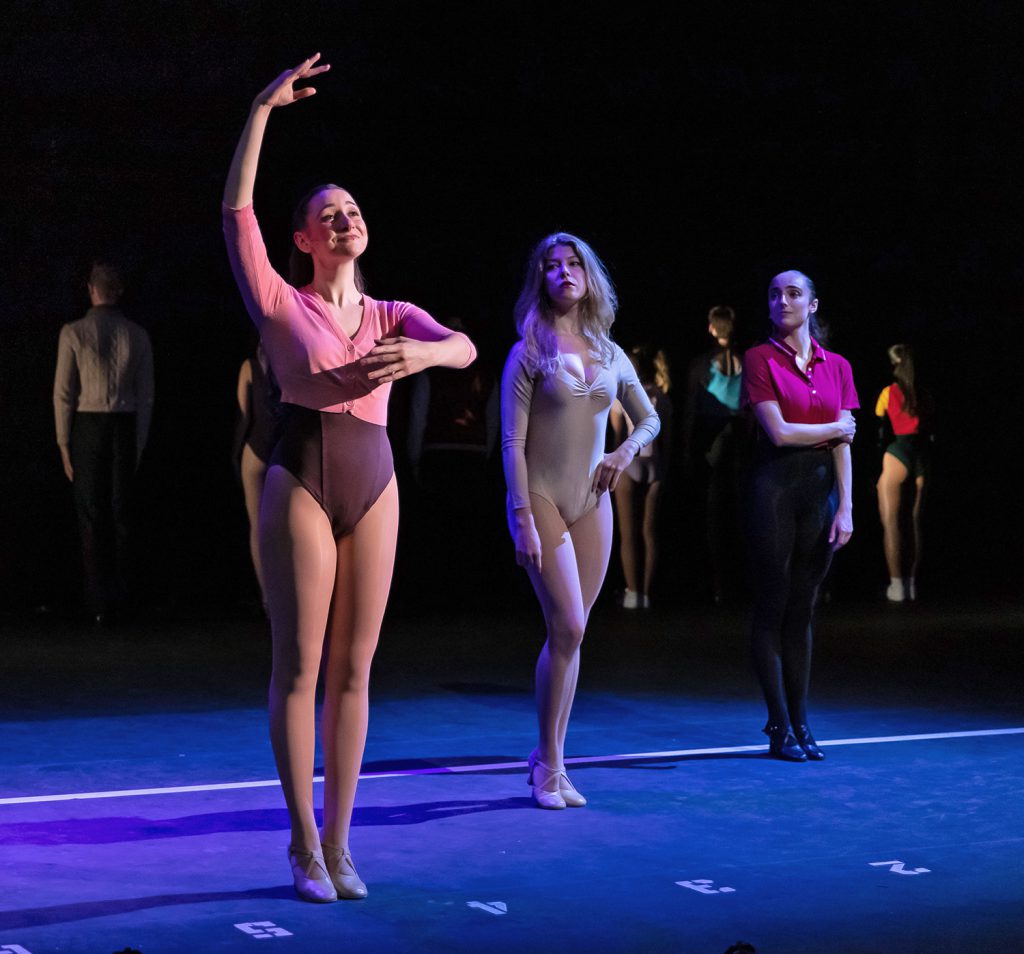
The lady dancers are the physically imposing, ultra-confident Sheila (Natalie Kastner), flirty Val (Haley Ayers), quirky Judy (Ava Cusitor), kindhearted Maggie (Kristen Daniels), petite Connie (Erika Harper), introverted Bebe (Ellery Smith), intense Diana (Daniella Castoria) and comically tone-deaf Kristine (Presley Nicholson).
Kristine and her outgoing husband Al (Bryce Bayer) are young marrieds who enjoy auditioning together for any new show. We also meet blasé Bobby (Ryan Mulvaney), basketball-crazy Richie (William Nelson), quick-study Mike (Al Love), hyper-masculine Don (Dorian Quinn), confident Greg (Patrick Murray), painfully shy Paul (Johann Santos), and barely-legal Mark (Benji Godley-Fisher), who at 20 is the baby of the group.
While giving Zach a sense of the person behind the façade of an otherwise nameless but essential figure, some of the dancers are tentative, some nervous or excited, some downright silly, but as seen in Laguna, all have personality-plus. Each gets his or her moment in the spotlight – under Zach’s penetrating gaze, of course.
Bennett, Kirkwood, Dante and company wisely positioned four consecutive “montages” exactly at the show’s center, compressing a substantial amount of character revelation into more compact, more accessible segments. The characters reveal themselves coming of age during “Hello Twelve, Hello Thirteen, Hello Love” that’s both poignantly and comically pointed.
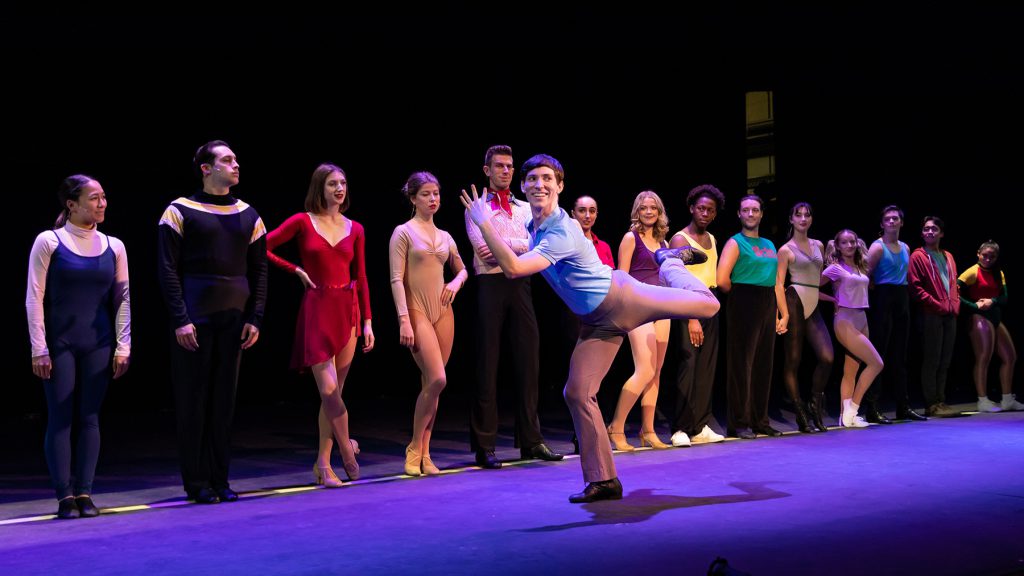
Love is engaging as Mike who, as a little tyke, was dragged along to his older sister’s ballet lessons, gravitating toward dance and discovering he was a natural.
Sheila comes on strong, and doesn’t she know it, and Kastner shows that the curvaceous, stunning blonde beauty’s preferred style blends caustic remarks and irony. Naturally, we learn why: Seeking escape from a sordid home life, she found solace in watching ballet dancers do their thing.
Nicholson’s semi-Valley Girl delivery doesn’t exactly fit the milieu, but Kristine’s jitters and comedic inability to carry a tune make her all the more endearing, while Bayer shows hubby Al as lovingly supportive.
Just a sweet kid at heart, Godley-Fisher’s Mark is rarin’ to go and appealingly unspoiled. Diana never shies from voicing her opinions, whether of herself, others, or of life, a quality bolstered by Castoria’s refreshingly no-B.S. persona. Quinn treads a much different fine line – in his case, projecting Don’s masculinity minus any off-putting swagger.
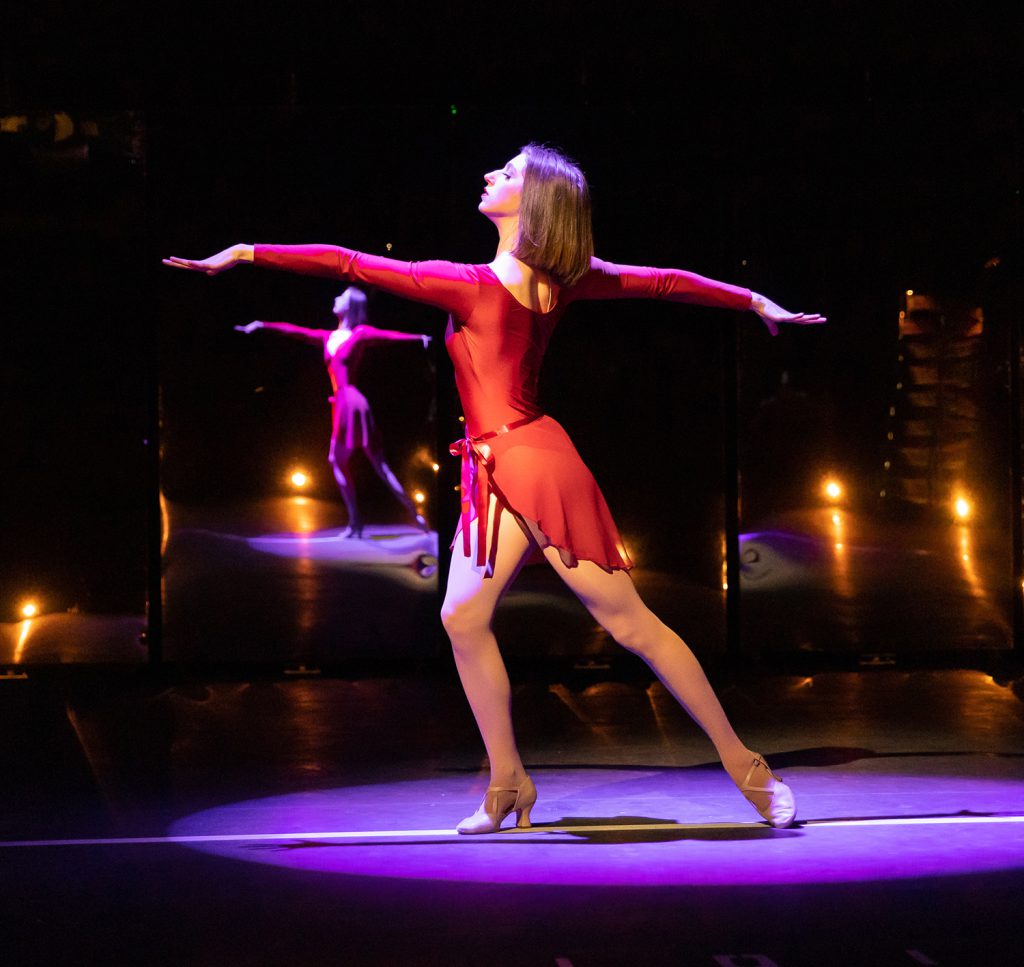
Having seemingly seen and done it all, Mulvaney’s Bobby finds life one big snoozer. Nelson’s zestful Richie has deftly transferred his agile moves from basketball court to the dance floor and the stage, and Murray lends Jewish gay Greg plenty of sass.
Nearly the oldest, stage vet Val is a youthful, tiny yet mighty dynamo. Pigtailed Ayers is more earthy and less effervescent than typical portrayals. A ribald highlight in Laguna is “Dance: Ten, Looks: Three” – Val’s success story, told in song, about a fantastic dancer no one noticed until she discovered enhanced boobs and derriere as the magical ticket.
Vinson makes the most of the basically utilitarian role of Zach’s right hand, who faithfully transmits harsh taskmaster Zach’s artistic visions to those hoping to be in the new show.
Van Dyke traces a clear arc from Zach, from unseen, God-like presence with a commanding voice who controls each dancer’s destiny to the confused, all-too-human lover once spurned by Cassie. This Zach is more flawed than we’d ever have guessed – and also more protective and nurturing.
The show’s second half delivers four of the best, and best-known, “Chorus Line” songs, and it’s also where the reticent Paul is finally coaxed out of his shell through Zach’s diligent prodding. Santos skates past the role’s darkest emotional colors in favor of stoop-shouldered humility, but his performance and the material’s potency more than compensate.
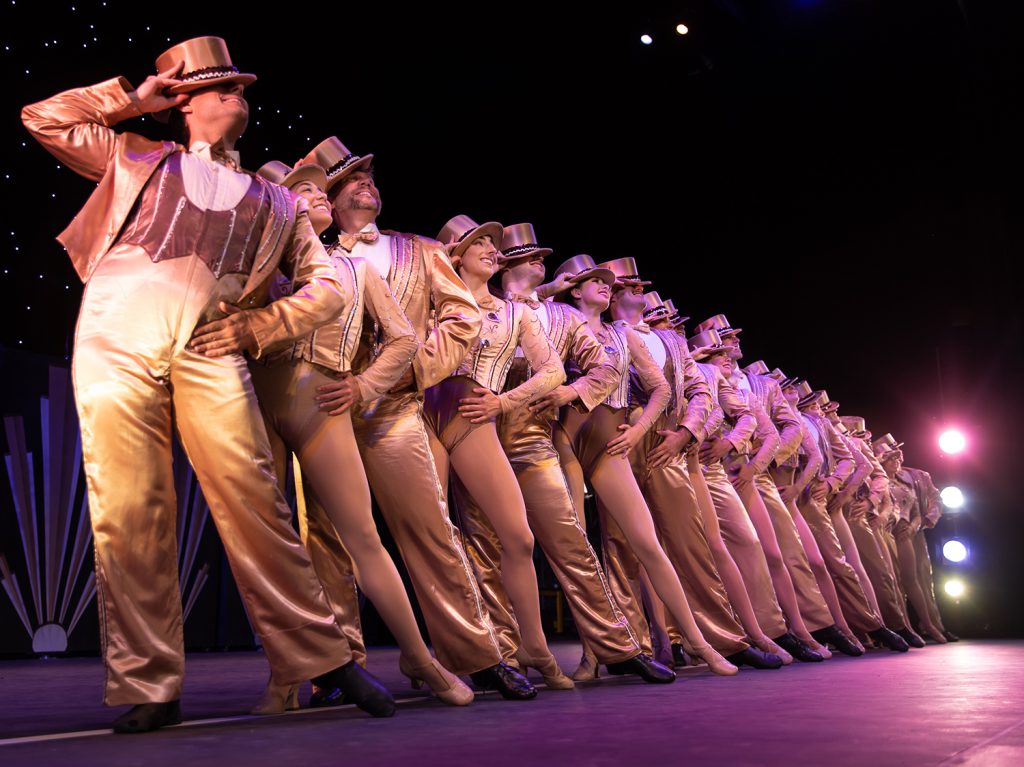
The post-intermission Act Two created in Laguna also focuses on the rocky, complicated dynamic between Zach and Cassie as they struggle to navigate their romantic past with what might be a familiar but now fraught working relationship.
Van Horn’s quivering voice signals Cassie’s self-doubt born of countless career defeats, but she finds inner strength in standing up for herself – and up to Zach – and in the extended solo dance sequence “The Music and the Mirror,” Van Horn’s fine dance talents sync up with Cassie’s star-making qualities.
“Dance Ten” and “Mirror” propel the show to its satisfying finale with two more justly famous numbers: “One” and “What I Did for Love.”
“One,” the rousing capper to Zach’s new show, is seen first in raw practice form and the second time as a full-blown showstopper as the entire cast (and not just the “final eight”) pulls out all the stops with more joy and fewer inhibitions than when it’s rehearsed.
The anthemic “What I Did for Love” counterbalances “One,” with Diana’s passion representing the price of success not just on stage, but anywhere. Castoria’s heartfelt rendition drives home the point: “Love” refers not just to romance but to the self-sacrifice and commitment required to fulfill any love: of career, of any art form, and for colleagues, family and friends.
Whether or not they make the final cut, these 17 characters have chosen to minimize life’s sorrows while putting everything “on the line” in both real life and their careers. “A Chorus Line” blurs the boundaries between the two, giving us an artful, stylized vision of reality.
Despite the show’s ’70s vibe, it transcends its original era by reflecting multiple aspects of human nature. Some of the monologues are simply extraordinary, just one reason the show has endured.
“A Chorus Line” broke new ground in its day, yet was, still is and probably always will be a crowd-pleaser.
Moulton Theatre, Laguna Playhouse, 606 Laguna Canyon Drive, Laguna Beach. Through June 12. Running time (intermission included): Two hours, 30 minutes. Tickets: $51 to $81. Ticket purchase/information: 949-497-2787, www.lagunaplayhouse.org



